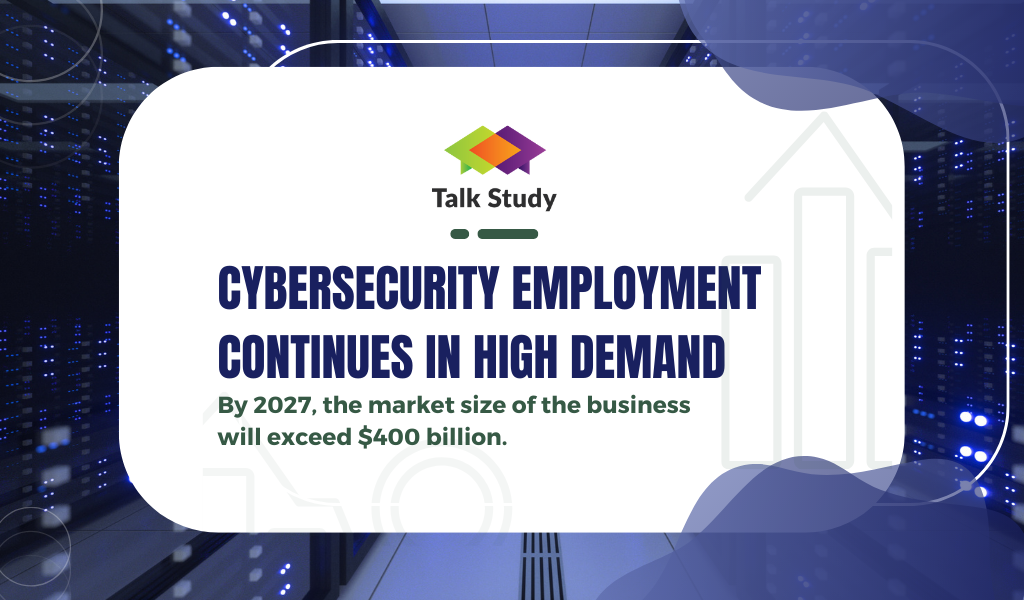What Should I Expect from Entry-Level Cybersecurity Occupations?
As stated in data conducted by Gartner, tech analysis and consulting firm, the market size of the global cybersecurity business in 2017 was around $86.4 billion. A decade later, the market is anticipated to expand by approximately 80%. BrandEssence, a market research firm, forecasts that the global cybersecurity market will reach $403 billion by 2027, with an annual compound increase of 12.5% from 2020 to 2027.
Kayne McGladrey, a senior member of the Institute of Electrical and Electronics Engineers (IEEE) and a cybersecurity strategist at Ascent Solutions, notes that this rapid development rate is due to a cycle of actions between cybercriminals and intelligence agencies. Customers of cybersecurity do not invest or hire at the same rate as cyber criminals.
Fortune quotes McGladrey as saying, “As a result, cybersecurity solution and product providers are strongly continuing to invest their profits into product innovation of – powered solutions designed to automatically detect and remediate the actions of these increasingly well-funded adversaries.” This cycle will continue as long as cybercriminals find it profitable, absent significant changes in how businesses prioritize and address cyber risks.
Why the cybersecurity sector is expanding so rapidly
The number of cyberattacks increases annually. According to Accenture’s State of Cybersecurity Report 2021, the annual total number of cybersecurity attacks increased by 31% between 2020 and 2021, reaching 270. In addition, the average quantity of successful cyberattacks per organization was 29.
In light of this, businesses of all sizes are now required to implement proper cybersecurity safeguards.
“Cybersecurity is an intrinsic element of all businesses, regardless of whether they are online or not, given the spread of payment networks, cloud data storage, and everything else,” says Yale Fox, IEEE member and CEO of Public Benefit Technologies in an interview with Fortune.
In addition, new technology is expanding rapidly. Fox notes that AI and machine learning are “only beginning to awaken,” as he states. We are currently in the midst of a renaissance.
Therefore, according to Yale, the industry could end up being more significant than the predicted $400 billion by 2027. We are in the storm’s centre for all IT industries’ rapid and exponential growth.
The requirement for cybersecurity experts
Massive industry expansion necessitates more trained cybersecurity specialists. However, we are already understaffed in the United States, primarily because there are not enough skilled and qualified individuals to function on some of these sophisticated systems.
Fortune quotes Adi Dar, president and CEO of Cyberbit. This company supplies a cybersecurity readiness and qualifications platform, saying, “Organizations face a challenge in employing cyber security professionals who are trained with the expertise to defend the complicated attack surface, such as the cloud, and can perform the new technologies purchased each year.”
According to a study by Emsi Burning Glass (formerly Lightcast), a market research firm, there are over 1 million cybersecurity employers in the United States; however, as of November 2021, there were approximately 715,000 unfilled jobs. According to Cybersecurity Ventures, the number of unfilled cybersecurity jobs increased by 350% between 2013 to 2021, from 1 million to 3.5 million.
Many occupations demand qualifications, certifications, or a master’s degree in the sector, even though companies continue to seek cyber talent.
“There are just not enough cyber security professionals with the expertise to tackle the emerging threat landscape,” adds Dar. “Government, education, and industry must urgently find a means to increase both the amount and quality of the cybersecurity workforce, or we will continue to observe an increase in spending year over year with little discernible effect.”
Find more related articles HERE






Recent Comments